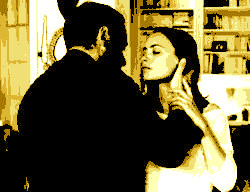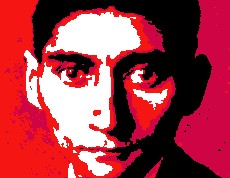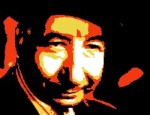Film Review
It's a sign of our times that couples who have fallen out of love and would
like to split up frequently cannot afford to do so financially and so end
up being forced into cohabiting, with the result that their home becomes a
battle zone. This is the all-too-familiar scenario that Belgian filmmaker
Joachim Lafosse concerns himself with in his latest film,
L'Économie
du couple. This claustrophobic drama depicting a man and woman from
two different social strata (he is the muscly prole, she the bourgeois doll)
has echoes of the director's earlier huis-clos drama
À perdre la raison
(2012), in which a woman is driven to multiple infanticide by her oppressive
domestic circumstances. This latest Lafosse offering isn't quite so
bleak but it does offer a portrait of a disintegrating relationship that is
harrowingly convincing and rather moving.
Playing the lead roles are two contrasting actors who have rarely been as
well-served on the screen as they are here by Lafosse's intelligent, insightful
and true-to-life script. Cédric Kahn is better known as a director
- of such acclaimed films as
L'Ennui
(1998) and
Roberto Succo
(2001) - but he is also a formidable actor, always at his best in serious
auteur fare such as the kind that Joachim Lafosse specialises in. With
his screen presence and subtlety as a performer, it's hard to comprehend why
Kahn hasn't already achieved star status and remains a virtual unknown, unlike
his co-star Bérénice Béjo who, following her success
in Michel Hazanavicius's
The Artist
(2011), has seen her career go from strength to strength. The effortlessly
glamorous Béjo and the much earthier Kahn make an unlikely couple
but both actors succeed in convincing us that, before they declared open
war on each other, their characters once had an intense, loving relationship,
the remains of which are still apparent in their perfect house and their
perfect children.
In this authentic depiction of a couple struggling to stay together for
the benefit of their separate bank balances there are strong echoes of the
class war, the seemingly interminable struggle between those who have the
money (the capitalists) and those who do all the work (the proletariat).
The characters played by Béjo and Kahn are obvious symbols of the two
sides in this eternal combat and their private battle visibly reflects the
wider one, between the employers and the workers, that rages with ever-increasing
enmity today. The film doesn't dwell excessively on this connection
but it lends a fitting topicality to the drama.
L'Économie
du couple has less of the shock value of Lafosse's previous films, which
tend to encroach on the more perverse aspects of human nature, and this is
to its benefit. What the director serves up this time is a more plausible
slice of life that offers a fresh perspective on a depressingly familiar
situation.
© James Travers 2017
The above content is owned by frenchfilms.org and must not be copied.
Film Synopsis
Marie and Boris have been together for fifteen years. They have two
daughters and have enjoyed a loving relationship, in spite of their different
social backgrounds. But recently they have drifted apart and the time
has come for them to go their separate ways. Unfortunately, Boris has
no money of his own and is having difficulty finding work to support himself,
so he has no choice but to go on living in the family house which Marie bought
with her own money. Since Boris undertook all of the renovations to
the house Marie can hardly turn him out, so they agree to go on living together
until they can sell the house. Living in such proximity, each bitterly
resentful of the other, causes the ex-couple's relationship to deteriorate
even further. Marie finds she can no longer bear her ex-partner's infantile
behaviour; Boris resents her financial independence. When they get round
to selling the house they must decide how to divide up the money from the
sale. This merely throws more fat onto the flames of their increasing
animosity...
© James Travers
The above content is owned by frenchfilms.org and must not be copied.



